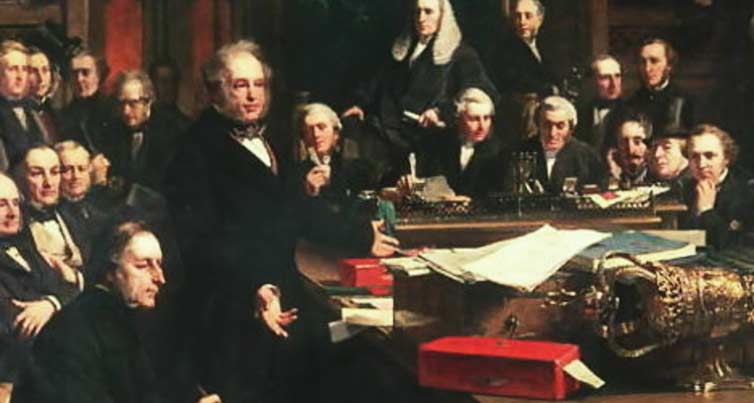As Britain prepares to enter what have been widely described as the most complex negotiations in recent history, politicians and civil servants dealing with Brexit can look to the 19th century for inspiration when it comes to securing the best trade deal for the country. Britain went through a similar process of reshaping its relationship with the world when it repealed the controversial Corn Laws and embraced the idea of free trade in 1846.
It’s a comparison that pro-Brexit economists have been eager to make, as it greatly benefited the UK economy at the time. But a closer look shows that the pursuit of the principle of global free trade is often tempered by compromise and political pragmatism.
The Corn Laws imposed tariffs and restrictions on grain imports between 1815 and 1846. This favoured domestic producers and kept grain prices (and the cost of living) high for the British public. Many of the leading lights among the Economists for Free Trade group (formerly, Economists for Brexit) argue that the EU’s Common Agricultural Policy is similar. CAP subsidises agricultural production for EU member states, ensuring artificially high prices. Ending CAP and switching to free trade, it is held, will therefore benefit British people by lowering food prices, ending subsidies and allowing the import of world produce at lower market prices.
To some extent, this is what happened after 1846, as Britain entered a period of relative affluence for most. But more dramatically, when the UK left the protectionist embrace of the Corn Laws, it set a radically new path by becoming the first major economy to adopt unilateral global free trade. This meant adopting customs duties for revenue only and abandoning any tariffs, which offered reciprocal benefits to individual nations – even to the extent of removing the preference given to imports of Canadian wheat in 1843.
In effect, the policy was one of no trade deals. It relied on unconditionally free imports and market advantage, rather than privileged access to ensure the continued prosperity of British exports. Britain vastly simplified its tariffs and by 1860 only a small number of revenue-raising import duties survived.
In pursuit of this unilateral policy, Britain also ended its previous approach to trade negotiations under the politician William Huskisson in the 1820s which had been based on the gradual extension of reciprocity treaties. Britain abandoned policies of imperial preference which had since the 17th century offered economic advantages to the colonies. The Navigation Acts, which were designed to benefit the British shipping industry, would also go in 1849.
For those most directly concerned in the trade regime – the politicians and officials at the Board of Trade – the appeal of unilateralism lay in ending decades of frustrating negotiations, which had been time-consuming and largely fruitless. This should give today’s negotiators pause for thought as they attempt to secure a trade deal within two years with the remaining 27 EU member states. And for them, the lack of a trade deal would not result in Britain unilaterally adopting free trade, but WTO tariffs as the easiest alternative. This would leave consumers in the UK and EU facing duties ranging from 4 per cent to 32 per cent.
Britain was the world’s foremost trading nation in 1846 so the case for unilateralism was bolstered by the belief that other nations would follow its example and bring about free trade across the globe. And there was some evidence to support this. The Walker Tariff of 1846, introduced by US President James Polk, lowered US tariff rates in anticipation of the repeal of the Corn Laws.
But, except in a few smaller nations, the political risks of free trade after the 1848 revolutions (involving disgruntled workers and uncompetitive manufacturers) deterred statesmen from decisive change. Some, schooled in the protectionist thinking of German economist Friedrich List, believed that “Perfidious Albion” – treacherous Britain – merely propagated free trade in its own self-interest. Therefore, only in the wake of a war scare between Britain and France in 1859 was the French emperor, Napoleon III, persuaded that free trade was a way to bolster peace as well as growth in a sluggish French economy.
This ultimately led to a return to the negotiating table. In what opened the floodgates to commercial treaty-making, the British liberal politician, Richard Cobden set out to negotiate a new trade deal with France, the leading continental economic power, in the autumn of 1859. Much to Cobden’s dismay, what he thought would take a matter of weeks, took over a year. It involved the intimate arrangement of what was by comparison with today a limited range of goods (and no services or non-tariff barriers to deal with).
Nonetheless, the Anglo-French Commercial Treaty of 1860 proved successful. A slew of bilateral, commercial treaties followed suit in the 1860s between European powers, helping to integrate the European economy and create what has been hailed as the “first common market”. Ironically, it was these treaties, rather than unilateral free trade, that brought Britain closest to its ideal of the 1840s – leading a tariff-free Europe and boosting British prosperity by global free trade.
![]() Britain in the 1860s therefore entered the European system of treaties in pursuit of the global free trade ideals her statesmen had outlined in the 1840s. Paradoxically, today it prepares to leave Europe, purportedly in a similar pursuit of global free trade, deal or no deal.
Britain in the 1860s therefore entered the European system of treaties in pursuit of the global free trade ideals her statesmen had outlined in the 1840s. Paradoxically, today it prepares to leave Europe, purportedly in a similar pursuit of global free trade, deal or no deal.
This article was originally published on The Conversation. Read the original article.


